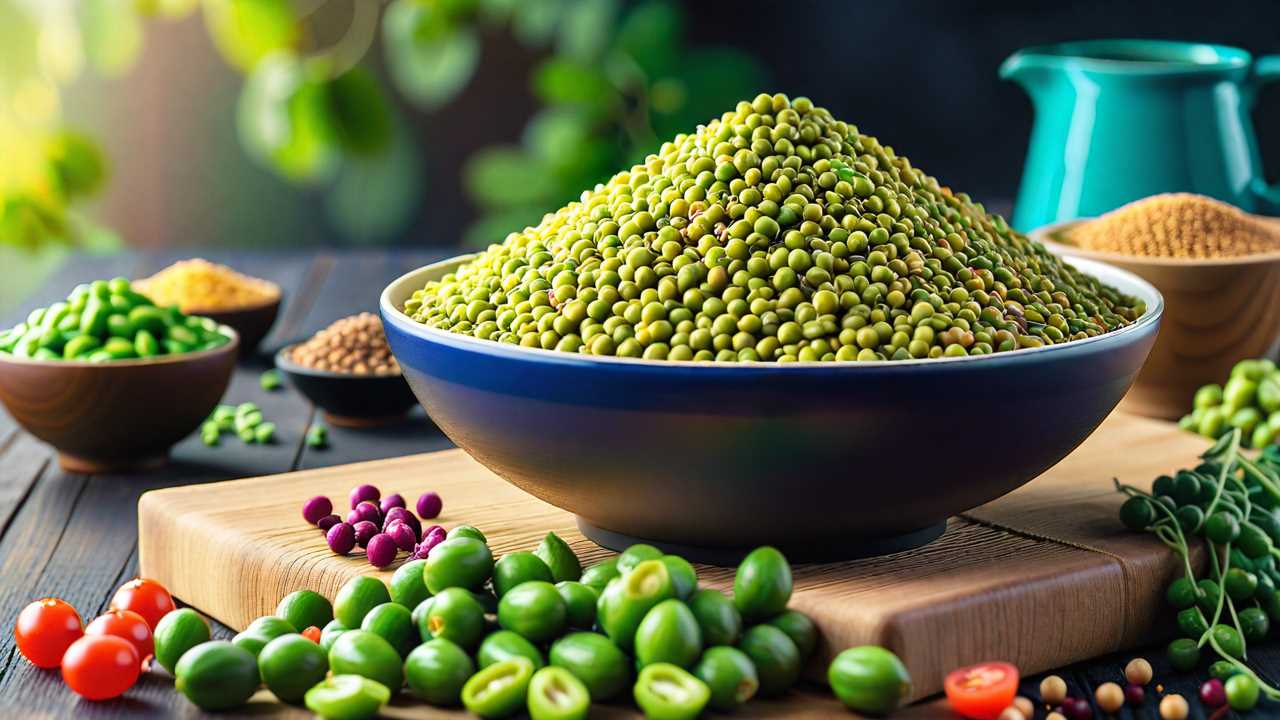Health
What Are the Best Plant-Based Protein Sources?

You might be surprised to learn that plant-based protein sources can provide as much protein as their animal-derived counterparts. However, with so many options available, how do you know which ones are the best for you? Let’s delve into the world of plant-based proteins and discover which ones stand out in terms of both nutritional value and taste.
Legumes
Legumes, such as beans, lentils, and chickpeas, are excellent plant-based sources of protein rich in essential nutrients. These humble legumes aren’t only budget-friendly but also pack a powerful nutritional punch. For example, a half-cup serving of cooked lentils contains about 9 grams of protein, making it a great option for those following a plant-based diet.
Chickpeas, also known as garbanzo beans, are another legume superstar, offering approximately 7 grams of protein per half-cup serving. Moreover, legumes aren’t only rich in protein but also provide a good amount of fiber, which is essential for digestive health and maintaining a feeling of fullness.
Additionally, they’re abundant in vitamins and minerals such as folate, iron, and potassium. This nutritional profile makes legumes a fantastic addition to your meals, whether you’re a vegetarian, vegan, or simply looking to incorporate more plant-based options into your diet.
Nuts and Seeds
Nuts and seeds are nutritious plant-based sources of protein that offer a variety of health benefits. These tiny powerhouses are packed with essential nutrients like healthy fats, fiber, vitamins, and minerals.
Almonds, for example, aren’t only a good source of protein but also provide vitamin E, magnesium, and antioxidants. Chia seeds are another excellent option, rich in omega-3 fatty acids, fiber, and antioxidants.
In addition to their protein content, nuts and seeds have been linked to various health benefits. Studies suggest that including them in your diet may help lower cholesterol levels, reduce inflammation, and support heart health.
For instance, flaxseeds are known for their potential to improve cholesterol levels and reduce the risk of heart disease.
To incorporate nuts and seeds into your meals, consider adding them to salads, yogurt, smoothies, or oatmeal. Snacking on a handful of mixed nuts or seeds can also be a convenient way to boost your protein intake throughout the day. Remember to enjoy them in moderation due to their calorie density.
Whole Grains
Whole grains are a valuable source of plant-based protein that offer a range of health benefits. Incorporating whole grains into your diet can provide you with essential nutrients like fiber, vitamins, and minerals, in addition to protein.
Examples of whole grains rich in protein include quinoa, brown rice, oats, and barley. These grains contain higher protein content compared to refined grains, making them a nutritious choice for those following a plant-based diet.
Quinoa, for instance, is a complete protein, meaning it contains all nine essential amino acids necessary for bodily function. Brown rice and oats are also excellent sources of protein that can be easily incorporated into meals.
Whole grains not only contribute to your daily protein intake but also support heart health, aid in digestion, and help regulate blood sugar levels.
To maximize the benefits of whole grains, aim to include a variety of them in your meals regularly. Whether it’s in salads, soups, stir-fries, or as a side dish, whole grains can be a versatile and delicious addition to your plant-based protein sources.
Plant-Based Protein Powders
Plant-based protein powders offer a convenient and concentrated source of protein for individuals looking to supplement their protein intake. These powders are typically made from plants like peas, rice, hemp, or soy, providing a wide range of amino acids essential for muscle building and overall health.
When selecting a plant-based protein powder, consider factors such as the protein content per serving, additional ingredients, and taste preferences. Pea protein powder, for example, is rich in branched-chain amino acids and easily digestible, making it a popular choice among plant-based athletes. Rice protein powder is hypoallergenic and suitable for those with food sensitivities.
Plant-based protein powders can be easily incorporated into smoothies, baked goods, or oatmeal to boost your protein intake. They’re a convenient option for post-workout recovery or as a meal replacement when you’re on the go.
Remember to carefully review labels to make sure the product meets your dietary needs and preferences. Experiment with different plant-based protein powders to find the one that fits best with your taste and lifestyle.
Frequently Asked Questions
Can I Get Enough Protein From Plant-Based Sources?
Yes, you can get enough protein from plant-based sources. Legumes, nuts, seeds, tofu, and whole grains are great options. Be mindful of variety and combine different sources throughout the day for best nutrition.
What Are the Best Plant-Based Protein Combinations?
Fuel your body with ideal plant-based protein combos like beans and rice, quinoa and chickpeas, or peanut butter on whole grain toast. These pairings provide a complete amino acid profile for sustained energy and muscle support.
Are There Any Plant-Based Proteins to Avoid?
When considering plant-based proteins, it’s advisable to avoid highly processed options that are loaded with additives and preservatives. Opt for whole food sources like legumes, nuts, seeds, and tofu for cleaner, more nutritious protein choices.
How Can I Increase Protein Intake on a Plant-Based Diet?
To increase protein intake on a plant-based diet, focus on foods like legumes, tofu, tempeh, nuts, seeds, and whole grains. Incorporate protein-rich snacks, smoothies, and balanced meals. Consider consulting a dietitian for personalized guidance.
Can Plant-Based Proteins Help With Muscle Building?
Yes, plant-based proteins can support muscle building. They provide essential amino acids necessary for muscle repair and growth. Incorporating a variety of sources like legumes, nuts, and seeds into your diet can help you reach your fitness goals.

Hello there! I’m Jeremy Ramirez, your go-to guy for all things content marketing and social media at NewsScroller. Currently residing in the vibrant city of Omaha, NE, I’m living my dream of combining my passion for journalism with the dynamic world of digital media.
I’m a proud graduate of the University of Nebraska, where I honed my skills and earned a degree in journalism. My college days were filled with endless learning, coffee-fueled study sessions, and the excitement of discovering the power of storytelling.
Post-graduation, I found my calling at NewsScroller, where I currently lead a team of creative minds in shaping compelling content strategies. Every day is a new adventure here – crafting stories, analyzing trends, and engaging with our vibrant online community.
When I’m not immersed in the digital world, you’ll find me cherishing moments with my amazing wife and our two energetic boys. Our family is completed by Dagwood, our adorable Pug, who always brings smiles to our faces.
Traveling is my escape and inspiration. I love exploring new cultures, tasting local cuisines, and capturing memories through my lens. As a speaker at social media events, I enjoy sharing insights and learning from fellow enthusiasts.
Curious about content marketing strategies or the latest social media trends? Or maybe you want to exchange travel stories? Feel free to reach out. I’m always up for a chat and eager to connect with like-minded individuals. Let’s navigate the exciting world of digital media together!
Want to know more or say hi? Drop me a message anytime!

